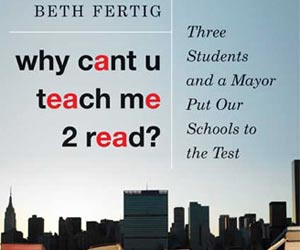
Yamilka, Alejandro, and Antonio are old enough to vote, but they can’t read. In Why Cant U Teach Me 2 Read?, Beth Fertig profiles these three young New Yorkers as they enter the world without basic literacy, following them for two years as they sue the city for extra help, get private tutoring, and make first-ever bookstore purchases.
So who is to blame for letting them fall through this massive educational crack? That’s not an easy question. To start with, Fertig’s subjects are among the fewer than 5 percent of kids with “hard-wiring problems” that make it extremely difficult to learn how to read (as opposed to the 20 to 25 percent of kids with “garden variety” reading problems). Fertig smartly pulls together shelves of research and animates data and theory with lively classroom scenes and interviews. She walks us through the “reading wars” between competing literacy pedagogies, but unfortunately none has a good solution for learners like Yamilka, who can’t hear that “book” and “cook” rhyme.
Are digital technologies to blame? Nope. In spite of the book’s title, text messaging actually helps Antonio with reading and writing. Other tempting culprits: Mayor Bloomberg and the technocrats who engineered the city’s recent educational overhaul, as well as No Child Left Behind and the never-ending assessments that are used “in lieu of curriculum and teaching,” as one school official grouses. But Antonio and Yamilka often blow off their tutoring sessions, and their brains stubbornly refuse to create the neural pathways necessary for fluent reading. By the end, it’s unclear whether we should celebrate or cry: After 1,500 hours of tutoring, for which the city paid $120,000, 25-year-old Yamilka can finally read compound words like “boyfriend.”













